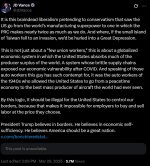fansink
Well-known member
Attendees at Taiwan President Lai Ching-te's meeting include TSMC’s deputy co-chief operating officer Cliff Hou and Foxconn chairman Young Liu.
TAIPEI - Taiwan President Lai Ching-te met tech executives on April 5 to discuss how to respond to new US tariffs, promising to ensure Taiwan’s global competitiveness and safeguard the island’s interests.
President Donald Trump announced across-the-board import tariffs on April 2 with much higher duties for dozens of trading partners, including Taiwan, which runs a large trade surplus with the United States and faces a 32 per cent duty on its products.
The US tariffs, however, do not apply to semiconductors, a major Taiwanese export.
Mr. Lai met the executives at his official residence to discuss the response to “the global economic and trade challenges brought about by the reciprocal tariff policy”, his spokesperson Karen Kuo said in a statement.
She did not say which companies were present, only that there were several representatives from the information and communications technology, or ICT, industry.
Mr. Lai “hopes to give industry the greatest support, stabilize the economic situation, ensure Taiwan’s industry’s global competitiveness, and safeguard our country’s national interests and the continued steady progress of our economy”, Ms. Kuo said.
Taiwan is home to TSMC, the world’s largest contract chipmaker and an important supplier to companies including Apple and Nvidia.
Taiwan media reported that attendees at Mr. Lai’s meeting include TSMC’s deputy co-chief operating officer Cliff Hou, who is also chairman of the Taiwan Semiconductor Industry Association, and Young Liu, the chairman of major Apple supplier Foxconn.
TSMC did not immediately respond to a request for comment on whether it attended the meeting. TSMC is in a quiet period ahead of its first quarter earnings announcement on April 17.
Foxconn also did not immediately respond to a request for comment.
On April 4, Taiwan’s government said it would provide T$88 billion (S$3.5 billion) in financial help for companies and industries to deal with the impact of the US tariffs.
Taiwan, which says the tariffs are unreasonable, has said it will discuss them with the United States and has not announced any retaliatory tariffs.

 www.straitstimes.com
www.straitstimes.com
TAIPEI - Taiwan President Lai Ching-te met tech executives on April 5 to discuss how to respond to new US tariffs, promising to ensure Taiwan’s global competitiveness and safeguard the island’s interests.
President Donald Trump announced across-the-board import tariffs on April 2 with much higher duties for dozens of trading partners, including Taiwan, which runs a large trade surplus with the United States and faces a 32 per cent duty on its products.
The US tariffs, however, do not apply to semiconductors, a major Taiwanese export.
Mr. Lai met the executives at his official residence to discuss the response to “the global economic and trade challenges brought about by the reciprocal tariff policy”, his spokesperson Karen Kuo said in a statement.
She did not say which companies were present, only that there were several representatives from the information and communications technology, or ICT, industry.
Mr. Lai “hopes to give industry the greatest support, stabilize the economic situation, ensure Taiwan’s industry’s global competitiveness, and safeguard our country’s national interests and the continued steady progress of our economy”, Ms. Kuo said.
Taiwan is home to TSMC, the world’s largest contract chipmaker and an important supplier to companies including Apple and Nvidia.
Taiwan media reported that attendees at Mr. Lai’s meeting include TSMC’s deputy co-chief operating officer Cliff Hou, who is also chairman of the Taiwan Semiconductor Industry Association, and Young Liu, the chairman of major Apple supplier Foxconn.
TSMC did not immediately respond to a request for comment on whether it attended the meeting. TSMC is in a quiet period ahead of its first quarter earnings announcement on April 17.
Foxconn also did not immediately respond to a request for comment.
On April 4, Taiwan’s government said it would provide T$88 billion (S$3.5 billion) in financial help for companies and industries to deal with the impact of the US tariffs.
Taiwan, which says the tariffs are unreasonable, has said it will discuss them with the United States and has not announced any retaliatory tariffs.

Taiwan president discusses US tariff response with tech execs
Taiwan is home to TSMC, the world’s largest contract chipmaker. Read more at straitstimes.com. Read more at straitstimes.com.

